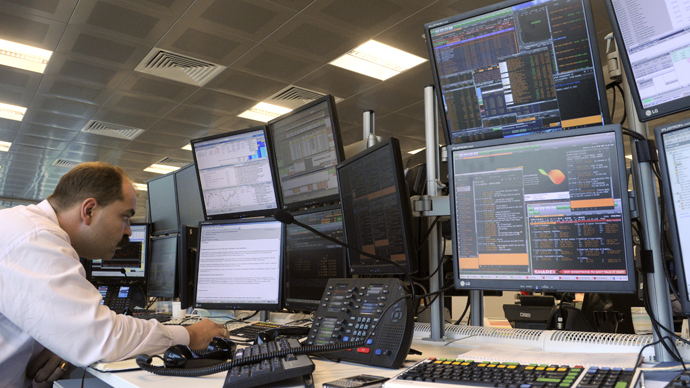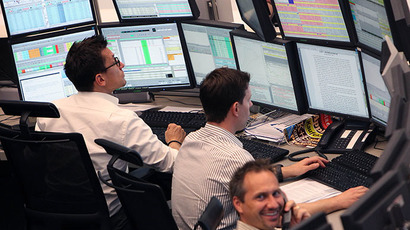Market Buzz: Touching new highs

All major world stocks set local records on Thursday after Ben Bernanke said the Fed would keep stimulating the world’s biggest economy for the “foreseeable future”. Russian markets hit a six-week high, as commodities climbed on the Fed’s announcement.
In a speech at Cambridge University, the head of the US Federal Reserve reassured investors that the $85 billion-a-month bond purchases will remain in place, until the economy shows clear signs of a recovery. So far the US remains far from target levels, with the unemployment rate stuck at its high of 7.6 percent and inflation at 1percent.
For a complete recovery the US labor market unemployment shouldn’t go beyond 6.5 percent. The fed’s inflation target rate is 2 percent, with “a number of experts believing that at the current stage the possibility of deflation elaborating is much higher than the risks of the inflationary spiral unwinding,” according to Aleksey Pukhaev of Investcafe.
The Bank of Japan also indicated this week it would maintain its monetary stimulus, with the European Central Bank and Bank of England saying they will keep their interest rates low.
“Monetary conditions are still very stimulatory and markets can get some comfort from that,” Chris Green, an Auckland-based strategist at First NZ Capital Ltd., a brokerage and wealth management firm, told Bloomberg. “Even though there is a recognition that tapering is on the way, the market has got more confidence that it’s not touching the brakes, just easing off the accelerator. That will be supportive for equities for some time.”
Both Russian indices got a significant boost in Thursday trading. The RTS was up 3.72 percent to 1,322.76, with the MICEX adding 2.58 percent to 1,368.11.
“We are seeing a reaction to the high oil price,” Ivan Manaenko, the head of research at Veles Capital, told Bloomberg Businessweek.
However, on Friday the commodity market starts to cool, with Brent crude losing 0.01 percent to $107.03/bbl.
“… in my view, the most likely scenario for the last week day would be retention of moderately positive sentiments and growth of the main indices within a percent. But in case of a strong correction in commodity floors the markets can close at a zero mark,” Andrey Shenk of Investcafe forecast.
The biggest story in corporate Russia on Thursday was the country’s largest drug-maker Pharmstandard that nosedived 8.4 percent to 1,707.80 rubles. This marked a 23 percent drop since July 8. Back then the company said it offered $630 million for its Singapore non-prescription drugs business - Bever Pharmaceutical - without explanation.
In Wall Street, Bernanke’s note pushed the S&P 500 index above its previous all-time high of 1,669.16 on May 21 and the Dow Jones above its high of 15,409.39 on May 28.
The Dow added 1.11 percent, to 15,460.92. The S&P was up 22.4 1.36 percent, to 1,675.02 and the NASDAQ rose 1.63 percent, to 3,578.3.
European markets finished broadly higher on Thursday with shares in Germany leading the region. The DAX was up 1.14percent, while France's CAC 40 added 0.74 percent and London's FTSE 100 rose 0.59 percent.
Asian markets are mixed in Friday’s session. The Nikkei 225 is higher by 0.30 percent, while the Shanghai Composite is leading the Hang Seng lower. They are down 0.51 percent and 0.39 percent respectively.
Among the stats to watch on Friday are the eurozone industrial
production numbers, as well as official data on producer price
inflation in the US and preliminary data from the University of
Michigan on July consumer sentiment.














